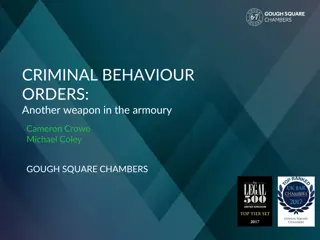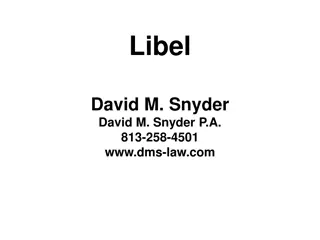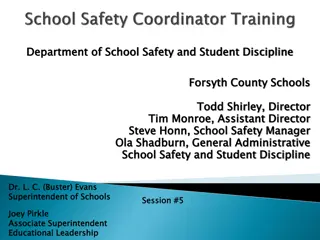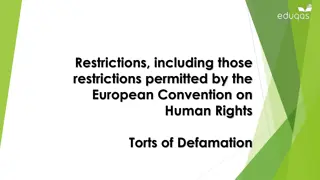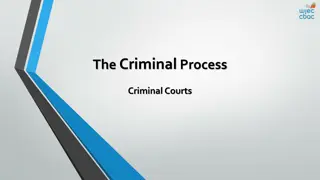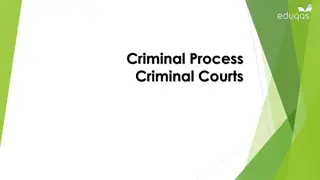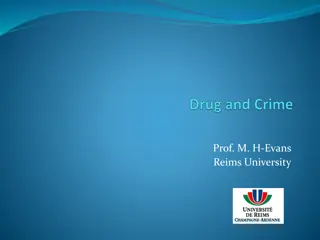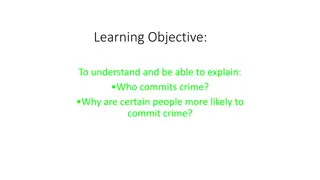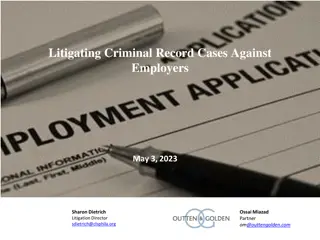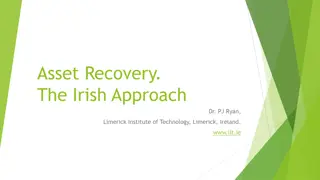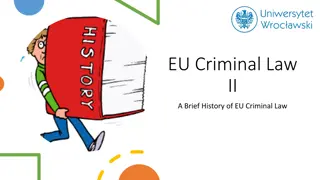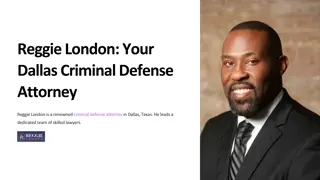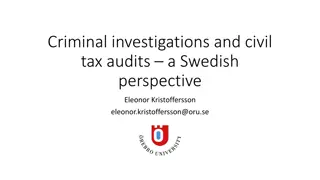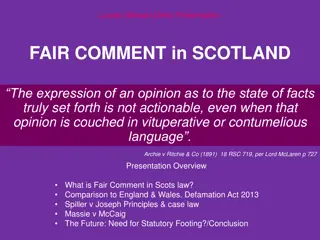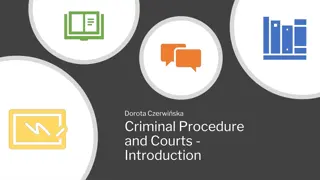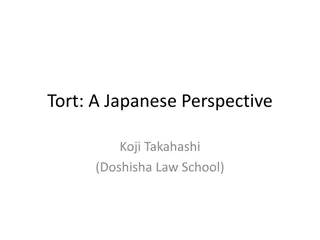United Nations Survey on Crime Trends and Operations of Criminal Justice Systems
The United Nations Survey on Crime Trends and Operations of Criminal Justice Systems (UN-CTS) focuses on harmonizing data collection, identifying crime patterns, improving monitoring of the criminal justice system, and enhancing international comparability of crime statistics. It was mandated by the
3 views • 18 slides
Harmonisation of Substantive Criminal Law in the EU
The Treaty of Lisbon serves as a legal foundation for the harmonisation of substantive criminal law within the European Union. It establishes the basis for judicial cooperation, mutual recognition of judgments, and approximation of laws across Member States. The treaty allows for the establishment o
2 views • 60 slides
Understanding Basic Legal Concepts Review
This content covers essential legal terminology such as crime, tort, intentional vs. unintentional torts, defamation, libel, slander, and elements of negligence in an easy-to-understand format. It provides definitions and explanations regarding fundamental legal principles that are crucial for anyon
1 views • 22 slides
Understanding Criminal Behavior from a Social Psychological Perspective
This unit delves into the application of social psychology in the legal system, exploring the nature of criminal behavior, responses to criminal acts, the criminal justice system, and rehabilitation. It examines the social ecological perspective of criminal acts and outlines key points related to th
0 views • 50 slides
Understanding Psychological Theories of Criminal Behavior
Psychologically-based criminologists attribute criminal behavior to individual factors such as negative early childhood experiences and inadequate socialization, leading to criminal thinking patterns and incomplete cognitive development. Probation and parole practices are influenced by rehabilitatio
0 views • 30 slides
Understanding the Basics of Torts in Business Law
Explore the fundamental concepts of torts in business law through an overview of various types of wrongful acts, such as interference with enjoyment, defamation, negligence, injunctions, strict liability, intentional torts, and trespass. Learn about the responsibilities and liabilities associated wi
0 views • 41 slides
Understanding Criminal Law and Procedure: Greenvisor's Case
A case study involving embezzlement by Joe Greenvisor, the chief accountant of Nobreath Corporation, sheds light on criminal acts, duties, intent, and societal perspectives on crime. Despite Greenvisor's charitable intentions, his actions constituted a crime under the law. The elements of criminal a
0 views • 47 slides
Understanding Criminal Offences: A Comparative Analysis
Exploring the concept of criminal offences, this article delves into the definitions in common law and continental law systems. It discusses the structural elements, harmful nature, prohibition, punishment, and distinctive aspects of criminal acts. A comparison between common law and continental law
1 views • 33 slides
Understanding Defamation Laws in Indian Penal Code 1860 Section 499
Indian Penal Code Section 499 defines defamation as making or publishing any imputation concerning a person intending harm or knowing it will harm their reputation. The section includes explanations regarding imputations towards deceased individuals, companies, and ironic expressions. To constitute
0 views • 10 slides
Understanding Cyber Laws in India
Cyber law in India encompasses the regulations governing cyber crimes, including theft, fraud, defamation, and more under the Indian Penal Code. The Information Technology Act of 2000 addresses modern crimes like cyber terrorism and credit card frauds. The necessity for cyber laws in India arises fr
0 views • 13 slides
Understanding the Process of Sealing Criminal Records
Having a criminal record sealed means making it inaccessible to the public while keeping it available to criminal justice agencies. Eligibility for sealing records requires taking action, and not everyone qualifies. This clinic provides guidance on the sealing process and the types of records that c
0 views • 36 slides
Understanding the Roles in Criminal Justice System
The criminal justice system involves three branches of government, each with specific responsibilities, operating at federal, state, and local levels. Law enforcement is primarily a local government function, while legislatures determine criminal laws and punishments. Statutes organized into codes d
0 views • 35 slides
Understanding Substantive Criminal Law in the American Legal System
Substantive criminal law encompasses the definition of criminal acts and penalties, with a core principle being that there can be no crime without a corresponding law. The American legal system follows the Rule of Law, ensuring that all individuals are subject to legal governance. Constitutional lim
0 views • 22 slides
Confiscation in the Criminal Courts: A Guide to Proceeds of Crime Law
Confiscation in the criminal courts involves depriving defendants of benefits gained from criminal conduct within their means. The Proceeds of Crime Law in the Cayman Islands sets guidelines for these proceedings, emphasizing that confiscation is not a form of punishment but aims to recover obtained
3 views • 17 slides
Understanding the Process of Sealing Criminal Records
Sealing criminal records means restricting public access to the records, although they are not destroyed and remain accessible to certain entities. Eligibility requirements vary, and action must be taken to seal records. This presentation covers the process, eligibility criteria, and what to expect
1 views • 36 slides
Understanding Defamation Laws: Media, Freedom of Expression, and Reputation
Exploring the intricacies of defamation laws, this content delves into the concepts of libel, slander, and reputation protection under various international treaties. It discusses the rights of individuals, public figures, and groups to pursue legal action for damage to reputation, as well as the co
4 views • 14 slides
Understanding Civil and Criminal Complaints in Legal Cases
Explore the distinctions between civil and criminal complaints in legal scenarios. Learn how a civil case seeks monetary damages while a criminal case pursues punishment for wrongful actions. Understand the roles of plaintiffs and prosecutors, burden of proof, and outcomes in both civil and criminal
0 views • 34 slides
Briefing on the Criminal Procedure Amendment Bill [B12-2021] to the Portfolio Committee on Justice and Correctional Services
The Criminal Procedure Amendment Bill aims to address the constitutional invalidity of section 154(3) of the Criminal Procedure Act by enhancing protection for child victims, accused, and witnesses in criminal proceedings. The Bill proposes prohibiting the publication of information revealing their
0 views • 12 slides
Understanding Criminal Behaviour Orders: An Overview and Legal Requirements
Criminal Behaviour Orders (CBOs) are issued following conviction for criminal offences to tackle serious and persistent anti-social behavior. This talk provides an overview of CBOs, legal requirements, when they are appropriate, and practical tips for implementation. The orders can prohibit or requi
0 views • 12 slides
Jordan Penal Code Overview: Punishments for Various Offenses
Jordan's penal code details punishments for different offenses such as murder, assault, intentional harm, negligence causing death, defamation, and document tampering. Penalties include imprisonment with hard labor ranging from five years to fifteen years, and fines up to JD50. Specific articles out
0 views • 8 slides
Making Better Decisions Adviser Forum - Scenario #1 Decision Making Dilemma
During the final night of NOAC, a lodge adviser faces a challenging situation involving a prank orchestrated by the lodge chief and others that has deeply affected a 13-year-old Scout. The incident escalates when inappropriate photos are shared on social media, leading to a difficult decision-making
0 views • 27 slides
Asset Recovery Practices in England and Wales: Criminal vs. Civil Proceedings
Asset recovery in England and Wales involves a combination of criminal and civil proceedings to secure justice and return funds to victims of crime. The CPS's Proceeds of Crime Division plays a crucial role in obtaining Restraint Orders and Confiscation Orders. Civil recovery, focusing on illicit fi
0 views • 11 slides
Understanding Libel Laws in Florida
Explore the definition of libel, how it pertains to publication of false statements, and the importance of truth as a defense against defamation. Learn about Florida jury instructions, the impact of literally true statements, and the complexities of proving the truth in a legal setting.
0 views • 20 slides
Social Media Risks and School Safety
Social media platforms like Facebook, Twitter, and Instagram pose risks such as cyberbullying, privacy breaches, and defamation issues for students. Information shared online can be used by bullies and predators, leading to potential harm and consequences like school discipline or arrest. Future imp
0 views • 34 slides
Understanding Defamation Law and Its Implications
Explore the intricacies of defamation law, including the requirements for proving a claim, available defenses, procedures for legal action, historical context, and comparisons between different Acts governing defamation. Learn about cases, elements of defamatory statements, and protections under the
0 views • 43 slides
Understanding the Criminal Justice System in Court Proceedings
This content explores various aspects of the criminal justice system, including the adversarial system, classification of offenses, criminal court systems, trial procedures, plea bargaining, and more. It covers models of criminal justice systems, classification of offenses, modes of trial, sending f
0 views • 15 slides
Overview of the Criminal Justice System
Exploring the complexities of the criminal justice system, this content delves into the adversarial system, classification of offenses, criminal court system, modes of trial, plea bargaining, trial procedures, and various criminal process models.
0 views • 15 slides
The Statistical Association Between Substance Misuse and Criminal Behavior
This brief synthesis discusses the statistical association between substance misuse (specifically drugs and alcohol) and criminal behavior. It draws upon meta-analyses investigating the links between drug use and crime, as well as alcohol consumption and violent behavior. Various theories are explor
0 views • 12 slides
Evolution of Criminal Law and Thought: From Pre-Classical Era to Enlightenment
Explore the progression of criminal law and thought from the Pre-Classical School of Thought to the Enlightenment era. Delve into concepts like folkways, mores, and the origins of criminal law, including examples such as societal norms, dress codes, and supernatural explanations for behaviors during
0 views • 23 slides
Exploring the Factors Behind Criminal Behavior
Understanding who commits crime and why certain individuals are more likely to engage in criminal activities involves exploring a range of social and biological factors. While biology suggests a genetic predisposition to criminal behavior, sociology emphasizes the influence of social factors like fa
0 views • 9 slides
Understanding Title VII and Criminal Records in Employment Discrimination Cases
This presentation delves into the intersection of Title VII and criminal records in employment discrimination cases. It covers the lack of specific protections for individuals with criminal records under Title VII, the implications of disparate impact cases, and the development of standards in the c
0 views • 15 slides
Asset Recovery: The Irish Approach towards Criminality
The paper discusses the emergence and structure of the Criminal Assets Bureau (CAB) in Ireland, highlighting the shift in approach towards dealing with criminal activities and the focus on targeting the proceeds of crime. It explores the operational positions and approaches adopted by CAB, emphasizi
0 views • 7 slides
Evolution of EU Criminal Law Through Cooperation and Commitment
The history of EU criminal law traces back to the Treaty of Rome in 1957 when the EU initially focused on economic matters. Over the years, with the judgment in the Stauder case in 1969 and the formation of the TREVI group in the 1970s, cooperation on security and combating terrorism laid the founda
0 views • 59 slides
Dallas Criminal Attorney | Frisco Criminal Attorney- Reggie London
Dallas Criminal Attorney: Dedicated Team of Criminal Defense Lawyers Led by Reggie London, Known for Unwavering Reliability and Steadfast Support. \/\/reggielondonlawyer.com\/
2 views • 7 slides
Exploring Criminal Law Basics
Delve into the fundamentals of criminal law through topics such as the definition of crime, the elements of a crime, why we have criminal law, and real-life scenarios to understand legal concepts. Discover the significance of criminal law in maintaining safety, encouraging good behavior, and promoti
0 views • 27 slides
Understanding the Interaction Between Criminal Investigations and Civil Tax Audits in Sweden
The relationship between criminal investigations and civil tax audits in Sweden is explored, highlighting how tax audits and criminal proceedings run concurrently. The mens rea requirement for criminal sanctions and tax surcharge, as well as the integration between criminal sanctions and tax surchar
0 views • 13 slides
Understanding Fair Comment Defense in Scottish Law
Fair comment is a common law defense in Scots law that facilitates freedom of speech by allowing opinions on matters of public interest. Compared to English law, Scotland has different approaches to defamation, with the Defamation Act 2013 mostly applying to England and Wales. The defense of fair co
0 views • 7 slides
Fundamentals of Criminal Law and Procedure
Explore the key aspects of criminal law and procedure, including definitions of crime, the role of criminal procedure, sources of law, phases of the criminal process, participants involved, and rules of evidence in legal proceedings. Gain insight into how criminal law is distinct from civil law and
0 views • 24 slides
Criminazisation of Peaceful Expressions: A Case Study of India
Indian governments use laws like sedition and defamation to stifle dissent, despite PM Modi's call for free speech. The sedition law, a colonial-era relic, is used against activists and critics, with vague language allowing misuse. Famous cases, including the arrest of Kanhaiya Kumar, highlight the
0 views • 13 slides
Japanese Tort Law: Choice of Law Rules and Double-Actionability
Japanese tort law follows specific choice of law rules, determining the applicable law based on factors such as the place of injury, product liability, and defamation. The double-actionability rule ensures that the harmful act is also unlawful under Japanese law and that remedies are available. This
0 views • 14 slides


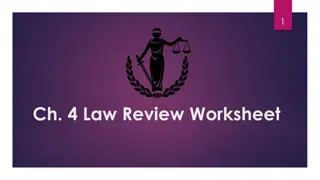


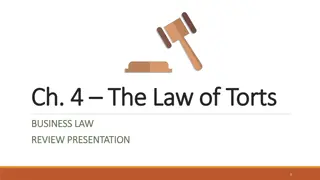
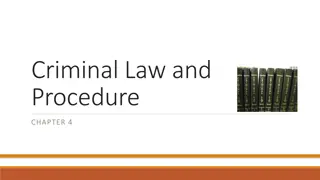
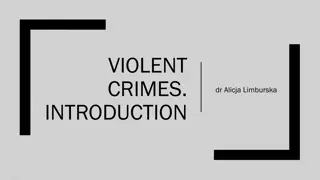
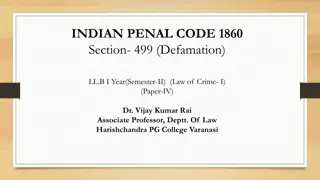
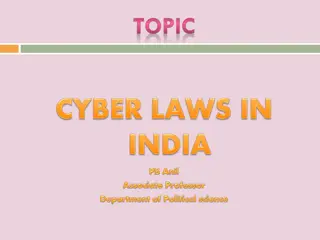

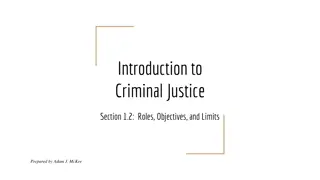
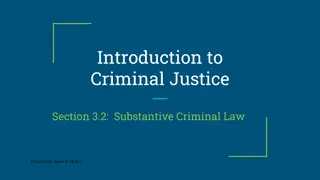
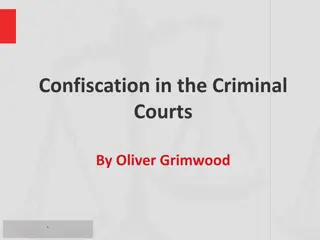

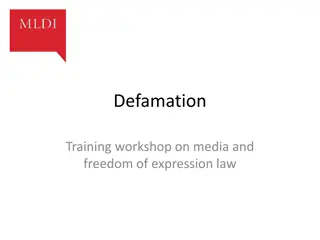
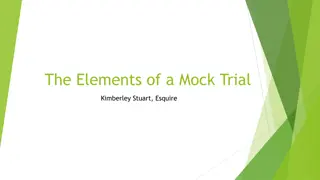
![Briefing on the Criminal Procedure Amendment Bill [B12-2021] to the Portfolio Committee on Justice and Correctional Services](/thumb/157093/briefing-on-the-criminal-procedure-amendment-bill-b12-2021-to-the-portfolio-committee-on-justice-and-correctional-services.jpg)
